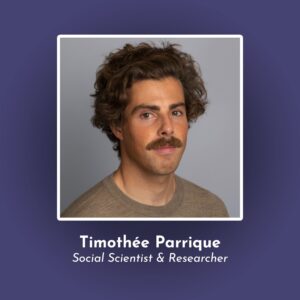
Ep 32 | Timothée Parrique
Timothée Parrique: “Degrowth: Slow is the New Cool”
On this episode, we meet with social scientist and researcher at the School of Economics and Management of Lund University, Timothée Parrique.
What is degrowth, and how will it help define our future?
Parrique explains how the path to societal degrowth might unfold and the social and physical obstacles we may encounter on our way there.
About Timothée Parrique
Timothée Parrique is a social scientist, originally from Versailles, France. He is currently a researcher at the School of Economics and Management of Lund University (Sweden).
He holds a PhD in economics from the Centre d’Études et de Recherches sur le Développement (University of Clermont Auvergne, France) and the Stockholm Resilience Centre (Stockholm University, Sweden). Titled “The political economy of degrowth” (2019), his dissertation explores the economic implications of degrowth.
Tim is the author of Ralentir ou périr. L’économie de la décroissance (September 2022, Seuil), a book adaptation in French of his PhD dissertation.
In French, we have a motto that says that a simple drawing is often better than a long explanation. Jean-Marc Jancovici Carbone 4 President
That’s very understandable because with left atmosphere thinking, one of the problems is that you see everything as a series of problems that must have solutions. Iain McGilchrist Neuroscientist and Philosopher
We can’t have hundreds and hundreds of real relationships that are healthy because that requires time and effort and full attention and awareness of being in real relationship and conversation with the other human. Nate Hagens Director of ISEOF
This is the crux of the whole problem. Individual parts of nature are more valuable than the biocomplexity of nature. Thomas Crowther Founder Restor
Show Notes & Links to Learn More
Download transcript00:45 – Timothée’s info + works
02:38 – Different kinds of energy in nature
04:35 – The problems with infinite growth
05:55 – Degrowth
06:28 – Economies with the appearance of green growth
06:57 – Rebound effect
06:59 – Green Growth, Decoupling
08:34 – Planetary Boundaries
11:14 – Overshoot
11:53 – Forecasts of economic growth
12:55 – 1.5 degree climate threshold
13:30 – Ecological systems being degraded
14:52 – GDP to Energy = 1:.993
15:20 – What is GDP?
15:49 – Steve Keen + TGS Episode
17:20 – We cannot grow without cheap fossil fuels
18:34 – Ecological economics
21:18 – The national income of France is sufficient to supply all its people’s needs
23:54 – Peter Victor book (2008) Slower by Design, Not Disaster
24:38 – Secular stagnation
26:40 – Shareholder control system
27:38 – French Citizen Convention for Climate – Yellow Vest Movement
29:51 – Planned Obsolescence
31:55 – Do people think that businesses should be community oriented
36:30 – Psychological studies show that the relationships we build are what make us happiest
37:01 – Ultimate Ends – Herman Daly
37:24 – Well-being economies
37:39 – Sweden shared washing machine systems
41:57 – Commons
46:12 – Deutch bank scenarios for underfilled natural gas reserves
46:36 – Greek forest protections during recession
47:50 – Poorly constructed, energy deficient homes
50:20 – EU bans sale of fossil car by 2035
51:08 – Great Reset – World Economic Forum
51:39 – Leverage points – Donella Meadows
51:50 – 127 Hours
53:40 – Norway system to phase out heavy polluting cars vs France’s fee based system
54:08 – France criminalization of planned obsolescence
54:18 – Vienna’s no for-profit housing
55:22 – In Sweden it’s forbidden to advertise to children under 12
59:05 – EU standard for Debt to GDP
59:39 – Loss aversion
1:00:20 – We are doubling our financial claims every 8 years
1:01:57 – Survey of list of things people feel are necessities
1:03:32 – Jason Hickel
1:08:18 – Talking to someone about these existential issues helps
1:12:08 – IPCC 6th report
1:12:21 – NYT survey reporting only 1% of Americans consider climate change the most important issue
1:12:50 – Risks of collapse of biodiversity
1:13:56 – Biofeedback
1:15:04 – Calls for boycotts among French graduates
1:15:49 – Lying flat movement in China, June 2021
1:15:59 – Younger generation puts less value on money and more on existential issues
1:16:49 – Chinese strike against mortgages
More – Analysis: Climate change, scarcity chip away at degrowth taboo







